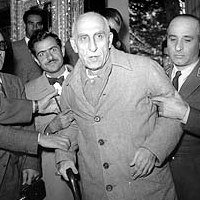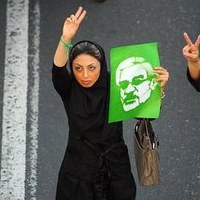![]()
Thu, March 03, 2011 | DebkaFile
Saudi King Abdullah bin Abd al-Aziz greets Iranian president Mahmoud Ahmadinejad upon his arrival at the airport in Riyadh, March 03, 2007. (Photo: Hassan Ammar/AFP)
Tehran’s hands-off Threat to Riyadh Incites Saudi Shiites to Revolt
Ahead of the first Day of Anger planned in Saudi Arabia for March 11, a senior Iranian figure close to Iranian President Mahmoud Ahmadinejad warned Riyadh Wednesday, March 2, against launching preventive security measures against, or cracking down on, the kingdom’s two million Shiites who live and work in the oil regions of the east.
The world’s biggest oil exporter, Saudi Arabia covers 40 percent of the world’s oil needs.
Saudi and other Gulf security sources called the Iranian warning unprecedented interference in the domestic affairs of Saudi Arabia and a call to the Shiite minority to rise up against the throne under the shield of Iran’s protection. It also struck the match for reigniting Shiite riots in Bahrain, fomenting the Shiite minorities in other Gulf emirates and further complicating the explosive situation in Yemen.
In Washington, Secretary of State Hillary Clinton came forward for the first time in the three-month wave of Arab uprisings to accuse Iran of using its Lebanese surrogate Hizballah to shape events in the Arab world. Addressing the Senate Budget Committee Wednesday, March 2, she said “They are doing everything they can to influence the outcomes in these places,” she said, citing Egypt, Bahrain, Yemen and the Palestinians, though not Saudi Arabia. “They are using Hizballah to communicate with counterparts. … in (the Palestinian movement) Hamas who then in turn communicate with counterparts in Egypt.”
Debkafile’s Washington sources note that the allegations she leveled against Iran contradicted the position taken by the Chairman of the US Chiefs of Staff Admiral Mike Mullen, who has said repeatedly in the last couple of weeks that the uprisings had domestic origins and Iran was not stirring the pot.
Clinton’s words also countered the view presented by Defense Secretary Robert Gates on March 1that the unrest in Arab countries was a major setback for Iran and al Qaeda.
The Obama administration is clearly divided on its reading of the upheavals in Arab countries and the role played in them by Iran, indicating that as the disturbances go into their third month, a consistent policy has yet to be formulated in the White House.
The warning to Riyadh came from Iranian parliament Mohammed Dehgan, one of the closest and most influential members of the Ahmadinejad circle. It was couched in stark and brutal terms: “The Saudi leadership should know that the Saudi people have become vigilant and do not allow the rulers of the country to commit any possible crime against them,” said Dehqan. “Saudi Arabia should account for the suppressions of the Shiite and Sunni people in the country for numerous years.”
He went on to threaten that Saudi Arabia, whose Shiite minority accounted for at least 15 percent of its population, could be the next target of the revolution engulfing the Arab world. The Iranian lawmaker went on to warn Saudi Arabia against interfering in the course of events in Bahrain and Yemen.
Dehqan and other senior Iranian officials have also warned Saudi Arabia to stop taking the fingerprints of Iranians entering the kingdom – or face reprisals.
Debkafile’s Gulf sources find three major implications in the harsh Iranian warning to Riyadh:
1. Tehran is for the first time taking an overt stand on the Arab uprisings, using their Shiite minorities as levers of manipulation.
2. Iran is flexing muscle for the first time in the role it covets of regional superpower which calls the shots for the oil states and challenges US supremacy.
3. Iran wants Riyadh to call off the preventive measures Saudi security and intelligence have been conducting for some days to offset a Shiite uprising on the Day of Anger, including the arrests of political and religious activists.



 RSS
RSS











Tehran's Hands-Off Threat to Riyadh Incites Shiites to Revolt | #iran #SaudiArabia #protests #oil http://j.mp/grLr5E
RT @CrethiPlethi: Tehran's Hands-Off Threat to Riyadh Incites Shiites to Revolt | #iran #SaudiArabia #protests #oil http://j.mp/grLr5E